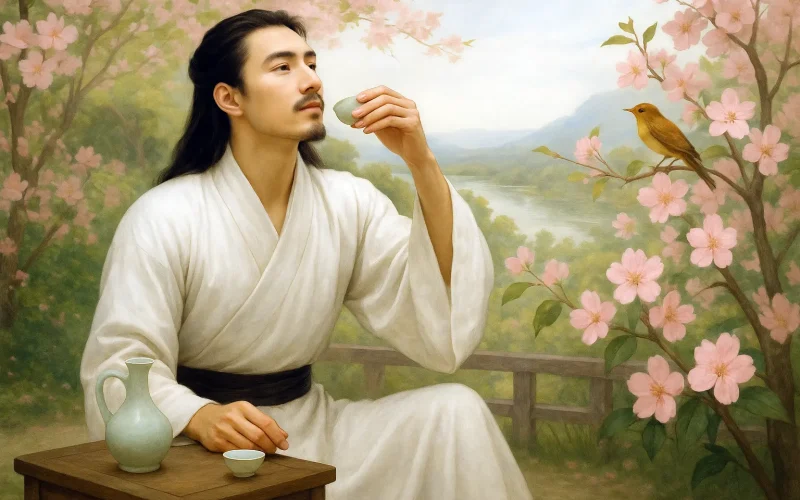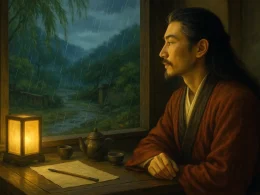There is a northern belle fair as can be;
Her tower seems to merge with clouds high.
Her eyes are brighter than the moon bright;
Her smile would delight a whole town with delight.
She often fears the blue grass may turn sere;
She sits and sighs when blows the autumn drear.
She plays sad music with her fingers fair,
And rises at dawn, sighing in despair.
How can she not meet with a lord full of grace,
Riding with him on a double phenix in the sky!
Original Poem:
「古风 · 燕赵有秀色」
李白
燕赵有秀色,绮楼青云端。
眉目艳皎月,一笑倾城欢。
常恐碧草晚,坐泣秋风寒。
纤手怨玉琴,清晨起长叹。
焉得偶君子,共乘双飞鸾。
Interpretation:
This poem is the twenty-seventh in Li Bai's series of Ancient Airs (59 poems), though its exact date of composition remains unknown. Using the metaphor of a beautiful woman from the Yan-Zhao region grieving over her fading youth, the poet symbolizes the lament of a talented individual unrecognized and unused by the world. Endowed with extraordinary talent, Li Bai himself was never consistently entrusted with significant responsibilities by the court, leading to a frustrated official career. Thus, he often used the image of a fading beauty to express his inner resentment and solitude. Written against this intellectual backdrop, the poem conveys the poet's profound sigh over the difficulty of finding a true appreciator and realizing his lofty aspirations.
First Couplet: "燕赵有秀色,绮楼青云端。"
Yān Zhào yǒu xiù sè, qǐ lóu qīng yún duān.
In Yan and Zhao there are women of striking beauty; Their ornate towers rise high into the azure clouds.
The poet begins by naming the region of Yan and Zhao, historically known for producing talented individuals and great beauties. "Ornate towers rising into the azure clouds" describes the lofty dwellings of these beauties, symbolizing both their nobility and their aloof solitude, reflecting the poet's own high talent and lofty ambitions, yet lack of opportunity.
Second Couplet: "眉目艳皎月,一笑倾城欢。"
Méi mù yàn jiǎo yuè, yī xiào qīng chéng huān.
Her brows and eyes outshine the bright moon; A single smile brings joy that captivates the entire city.
This couplet describes the woman's peerless beauty, comparing her clear loveliness to the "bright moon" and using "a smile that captivates the city" to highlight her stunning charm. In reality, this praise is Li Bai's metaphor for himself, implying his own brilliant talent that nevertheless remains unappreciated.
Third Couplet: "常恐碧草晚,坐泣秋风寒。"
Cháng kǒng bì cǎo wǎn, zuò qì qiū fēng hán.
Often she fears the lush grass will wither with time; Sitting alone, she weeps in the cold autumn wind.
Here, "lush grass" symbolizes youthful prime, while "cold autumn wind" represents the ruthlessness of time and the approach of old age. The beauty fears the passing of her youth, just as the talented scholar fears the wasting of time and the failure of his ambitions. This layer of sorrow reflects the deep melancholy and helplessness in the poet's heart.
Fourth Couplet: "纤手怨玉琴,清晨起长叹。"
Xiān shǒu yuàn yù qín, qīng chén qǐ cháng tàn.
Her slender fingers express grief upon the jade zither; At dawn she rises, heaving endless sighs.
Using music to convey sorrow is a common technique in classical poetry. The "jade zither" here symbolizes the beauty's inner voice, as well as the poet's own resentment. The "endless sighs" express not only sorrow over fading youth but also profound lament over unrecognized talent.
Fifth Couplet: "焉得偶君子,共乘双飞鸾。"
Yān dé ǒu jūn zǐ, gòng chéng shuāng fēi luán.
How may I meet a noble gentleman, To ride together with him on a pair of soaring luan-birds?
The poet uses the beauty's longing for a worthy man to metaphorically express his own desire to meet a kindred spirit and gain recognition. The "pair of soaring luan-birds" symbolizes ideal union and pursuit, conveying the poet's hope to find a true enlightened ruler, realize his ambitions, and achieve great deeds.
Holistic Appreciation
Superficially depicting a beauty's charm and sorrow, the poem actually implies the poet's own frustration in his official career. The first four lines intensely describe the beauty's captivating appearance, paving the way for the subsequent lament. The following lines express the beauty's sorrow over the passage of time, which implicitly contains the poet's anxiety over wasted years and unused talent. The final couplet concludes with "How may I meet a noble gentleman," highlighting the theme: the poet's longing to meet someone who appreciates him and realizes his aspirations, rather than being buried in obscurity. The poem's emotion progresses from beauty to sorrow, and from sorrow to hope, layer by layer, forming a vivid portrait of Li Bai's self-comparison.
Artistic Merits
- Metaphorical Technique, Profound Meaning: The poet uses the beauty as a self-metaphor, youth as a metaphor for official career, and the "noble gentleman" as a symbol for an enlightened ruler, conveying dissatisfaction with reality through layered implications.
- Contrastive Method, Intensified Emotion: The first half depicts the beauty's radiant brilliance, while the second half is full of sorrow; this contrast highlights the talented scholar's distress at being unrecognized.
- Elegant Language, Subtle Atmosphere: The poem uses beautiful language, such as "brows and eyes outshine the bright moon" and "fears the lush grass will wither," creating strong imagery and a lingering, profound poetic effect.
- Layered Emotional Progression: From the description of the beauty's appearance, to the fear of fading youth, and finally the deep sigh longing for a soulmate, the emotion gradually intensifies, becoming increasingly relatable.
Insights
This poem is not merely a beauty's lament over fading youth but also a portrayal of a talented scholar's grief over unrecognized abilities. Using the beauty as a metaphor for himself and her difficulty finding a soulmate to symbolize the talented individual's struggle to find an enlightened ruler, Li Bai expresses his sorrow over the passage of time and unfulfilled ambitions. In life, while talent is crucial, opportunity and a discerning patron are equally indispensable. With profound sentiment, the poet reminds us to cherish time and warns those in power to value talent, allowing true ability to flourish rather than be buried by the years.
About the poet

Li Bai (李白), 701 - 762 A.D., whose ancestral home was in Gansu, was preceded by Li Guang, a general of the Han Dynasty. Tang poetry is one of the brightest constellations in the history of Chinese literature, and one of the brightest stars is Li Bai.












